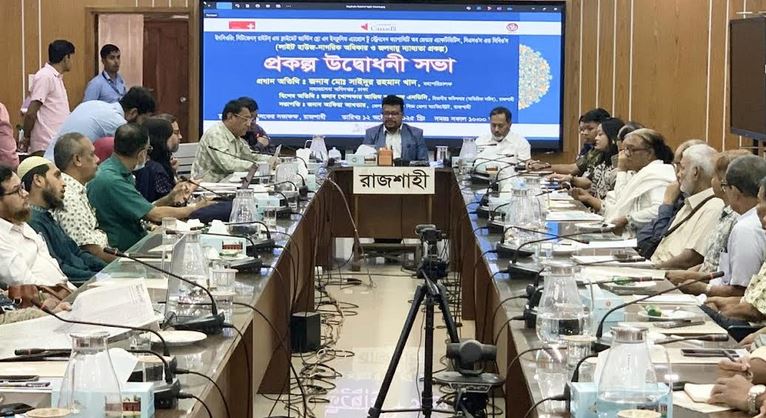News Flash
News Flash

RAJSHAHI, Oct 12, 2025 (BSS) - Integrated efforts of all relevant government and non-government organizations can be a crucial means of strengthening women’s leadership, particularly in marginalized areas.
Joint initiatives are also essential to promote social inclusion along with building resilience against the adverse impacts of climate change at the community level.
Government officials and development activists made the observation while addressing a project launching ceremony at the conference hall of the Deputy Commissioner (DC) office here today.
Light House, as part of the implementation of its project titled “Ensuring citizens’ rights and climate justice through an inclusive approach to strengthen capacity of gender activists, CSOs and CBOs,” organized the meeting with support from the Embassy of Switzerland and Global Affairs Canada.
Director General of the Department of Social Services Saidur Rahman Khan and Commissioner of Rajshahi Division Khondoker Azim Ahmed addressed the meeting as chief and special guests, respectively, with DC Afia Akhter in the chair.
Divisional Director of the Department of Social Services Syed Mustaque Hasan, Superintendent of Police Farzana Islam, Chief Executive of Light House Harun Or-Rashid, and Aziza Asfin from GFA Consulting Group also spoke.
During his concept paper presentation, Project Manager Musfiqur Rahman gave an overview of the project and its aims, objectives, and implementation strategy.
It aims to improve the ability of gender activists, civil society organizations (CSOs), and community-based organizations (CBOs) to effectively advocate for citizens' rights and climate justice.
The 30-month project will also work to ensure that climate change policies and actions are inclusive, gender-responsive, and address the needs of marginalized groups.
By linking community engagement with climate resilience, the initiative aims to contribute directly to achieving Goals 5, 13, and 16 of the Sustainable Development Goals (SDGs)—promoting gender equality, climate action, and inclusive institutions.
Musfiqur Rahman also told the meeting that building the skills of activists and organizations in areas like climate change adaptation, disaster risk reduction, and gender-responsive policy analysis is the prime objective of the project.
It is intended to create and strengthen platforms for these groups to engage in dialogue with government stakeholders and advocate for transparency and accountability in climate action.
Saidur Rahman Khan said women’s empowerment and rights are fundamental to achieving sustainable development, as women play a crucial role in combating climate change.
He underscored the need for close coordination among the government, civil society, and development partners, as it is essential for building an inclusive and resilient society.
Describing climate change as an everyday reality rather than a distant concern, Khondoker Azim Ahmed said local engagement is very important for sustainable adaptation.